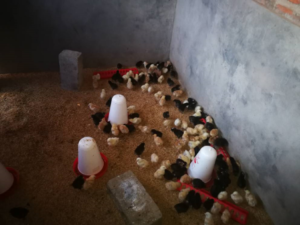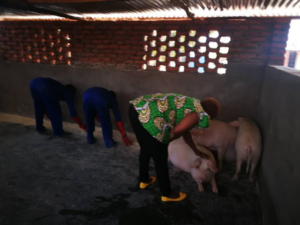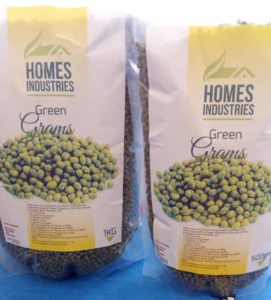 Women make significant contributions to ending hunger and are responsible for ensuring their families have well-balanced diets to fight malnutrition. Women are also responsible for growing and preparing most of the meals in any household and contribute significantly to Sustainable Development Goal Two (SDG2) – Zero Hunger. African agriculture overall is dominated by smallholder farmers and a large percentage of these are women, responsible for key components of household production such as weeding, harvesting, and processing thus bringing women to the forefront of Africa agriculture.
Women make significant contributions to ending hunger and are responsible for ensuring their families have well-balanced diets to fight malnutrition. Women are also responsible for growing and preparing most of the meals in any household and contribute significantly to Sustainable Development Goal Two (SDG2) – Zero Hunger. African agriculture overall is dominated by smallholder farmers and a large percentage of these are women, responsible for key components of household production such as weeding, harvesting, and processing thus bringing women to the forefront of Africa agriculture.
The Graça Machel Trust works with women in agribusiness, through its African Women in Agribusiness (AWAB) Network. AWAB seeks to increase women’s roles in targeted agricultural value chains, address food security needs as well as, propel women’s agricultural activities beyond subsistence farming and into viable businesses.
AWAB’s work is anchored in the significant role women in agriculture must increasingly play to ensure they are part of the decision making and policies that informs Africa’s food sovereignty which is defined “the right of peoples to define their own food and agriculture; to protect and regulate domestic agricultural production and trade in order to achieve sustainable development objectives; to determine the extent to which they want to be self-reliant; to restrict the dumping of products in their markets, and; to provide local fisheries-based communities the priority in managing the use of and the rights to aquatic resources.” The UN Human Rights Council recently approved the declaration of the rights of peasants and other people working in rural areas. This indicates a global consensus on the rights of small holder farmers, mostly women in Africa, and the need to recognise and enable them to play in the global food system.
The SDG 2 seeks to end hunger and malnutrition, ensure access to safe, nutritious and sufficient food. Sustainable and resilient food production systems are a key factor in achieving this goal. Implementing sustainable agricultural practices can help ensure future food security in a scenario of increasing demand and changing climate.
Below we focus on two women in our AWAB network who are playing their part in addressing food and nutrition in Malawi.
Peggy Ngwira is diversifying her crops to help maintain healthy soils



Peggy Ngwira co-owns Likuni Green Farming which focuses on producing hybrid chickens, local chickens, fish, green house vegetables and bananas through traditional ways of farming. Peggy’s farm also produces organic fertilizers and uses integrated cultural, biological, and mechanical ways to develop recycled resources, promote ecological balance and conserve bio-diversity to maintain healthy soils. This also contributes to reducing the effects of climate change. She is also helping to eliminate poverty by empowering women and promoting self-empowerment by providing agri-business. As the number of consumers are concerned about their health and the risk of consuming genetically modified and chemically enriched food products.
“I am different because I recycle everything at my farm, I use green methods of farming because I care about the environment,” she said.
Victoria Mwafulirwa: the woman focused on improving the quality of affordable nutritious food



After identifying a gap and lack of quality, clean and affordable nutritious food in her community especially for ingredients for her catering business, Victoria Mwafulirwa established Homes Industries in 2016, an agri-processing business that is adding value to sunflower to produce cooking oil and peanuts to produce peanut flour and also grows lentils. Peanut flour locally known as nthendero or nsinjiro is a popular ingredient for porridge and vegetables that make a very nutritious and healthy dish in Malawi. It is desired by everyone regardless of socio-economic status due to its protein rich components which is good for body building and combating malnutrition in young children.
Victoria is recognizing the value of rural communities around her and understands that they need to empower themselves, as such, she uses an out-grower scheme where 1,250 smallholder farmers are involved in the production of sunflower, groundnuts and green-grams among others. This is helping in building their capacity through the training that is provided to them in good agricultural practices and looking at agriculture as a business for economic empowerment. 80% of the farmers she has employed are women.
“These women are the key to providing food for their families, they also enrich the communities in which we live in, if more female farmers are provided with technical support and inputs, we are assured of not only a food secure future, but also an economic growth that is stable and sustainable. Women farmers and their value chains are the future”, she said.
Learn more about our Women’s Economic and Social Advancement programme here.










 The Trust supports and mobilises civil society networks on issues of ending child marriage, ending violence against children, ending female genital mutilation and promoting children’s rights, to carry out advocacy and action across Africa. Special focus is placed on Malawi, Mozambique, Tanzania and Zambia where child marriage continues to be a problem largely driven by poverty, gender inequality, harmful traditional practices, conflict, low levels of literacy, limited opportunities for girls and weak or non-existent protective and preventive legal frameworks.
The Trust supports and mobilises civil society networks on issues of ending child marriage, ending violence against children, ending female genital mutilation and promoting children’s rights, to carry out advocacy and action across Africa. Special focus is placed on Malawi, Mozambique, Tanzania and Zambia where child marriage continues to be a problem largely driven by poverty, gender inequality, harmful traditional practices, conflict, low levels of literacy, limited opportunities for girls and weak or non-existent protective and preventive legal frameworks.




 Education is a fundamental right for all children, which is also a vehicle for social, economic and political transformation in communities, countries and the African continent at large. Recent studies indicate a lack of progress in some of the critical commitments aimed at improving education quality, access, retention and achievement, particularly for girls. In most African countries, girls may face barriers to learning, especially when they reach post-primary levels of education. By implementing multi-dimensional approaches to education which includes core education, personal development, life skills and economic competencies, the Trust partners with funding partners, governments, civil societies and the private sector to improve education access.
Education is a fundamental right for all children, which is also a vehicle for social, economic and political transformation in communities, countries and the African continent at large. Recent studies indicate a lack of progress in some of the critical commitments aimed at improving education quality, access, retention and achievement, particularly for girls. In most African countries, girls may face barriers to learning, especially when they reach post-primary levels of education. By implementing multi-dimensional approaches to education which includes core education, personal development, life skills and economic competencies, the Trust partners with funding partners, governments, civil societies and the private sector to improve education access.

 The Nutrition and Reproductive, Maternal, New-born, Child and Adolescent Health and Nutrition, (RMNCAH+N) of the Children’s Rights and Development Programme aims at promoting the Global Strategy for women, children and adolescents’ health within the Sustainable Development Goals (SDG) agenda. The strategy emphasises on the importance of effective country leadership as a common factor across countries making progress in improving the health of women, children and adolescents.
The Nutrition and Reproductive, Maternal, New-born, Child and Adolescent Health and Nutrition, (RMNCAH+N) of the Children’s Rights and Development Programme aims at promoting the Global Strategy for women, children and adolescents’ health within the Sustainable Development Goals (SDG) agenda. The strategy emphasises on the importance of effective country leadership as a common factor across countries making progress in improving the health of women, children and adolescents. Through its Early Childhood Development (ECD) plan, The Trust will seek to put into action the new science and evidence Report that was presented by Lancet Series on Good and early development – the right of every child. This will be achieved by mobilising like-minded partners to contribute in the new science and evidence to reach all young children with ECD. The Trust’s goal is to be a catalyst for doing things differently, in particular, to rid fragmentation and lack of coordination across ECD sectors. In response to evidence showing the importance of political will in turning the tide against the current poor access and quality of ECD. Even before conception, starting with a mother’s health and social economic conditions, the early years of a child’s life form a fundamental foundation that determines whether a child will survive and thrive optimally.
Through its Early Childhood Development (ECD) plan, The Trust will seek to put into action the new science and evidence Report that was presented by Lancet Series on Good and early development – the right of every child. This will be achieved by mobilising like-minded partners to contribute in the new science and evidence to reach all young children with ECD. The Trust’s goal is to be a catalyst for doing things differently, in particular, to rid fragmentation and lack of coordination across ECD sectors. In response to evidence showing the importance of political will in turning the tide against the current poor access and quality of ECD. Even before conception, starting with a mother’s health and social economic conditions, the early years of a child’s life form a fundamental foundation that determines whether a child will survive and thrive optimally.